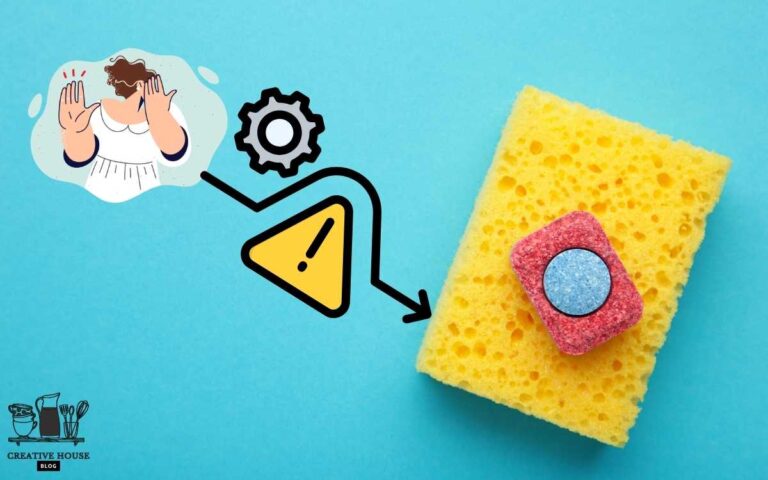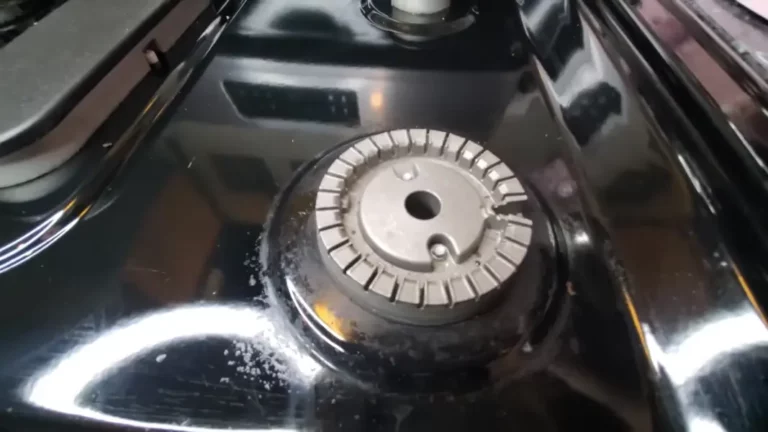There have been concerns and debates surrounding the question of Can dishwasher detergent cause cancer and whether is it safe for health.
Research has shown that exposure to harmful chemicals in dishwasher detergents causes inflammation in human cells. But the number of such chemicals and the use of the dishwasher are highly dependent on the fact.
Let us dive into the topic and explore the facts to determine whether there is any truth to these claims.

Can Dishwasher Detergent Cause Cancer?
Dishwasher detergents typically contain a combination of surfactants, enzymes, bleach, and other chemicals designed to break down grease, remove stains, and disinfect dishes. While these ingredients are effective in cleaning, questions arise about their safety, especially when it comes to long-term exposure.
The extensive use of dishwasher detergent can cause chronic inflammatory diseases. Read the paper here.
Dishwasher powder consists of various ingredients and each of them has its role to play. One of the components often scrutinized in dishwasher detergents is phosphates. Phosphates are chemicals that break down food particles and prevent them from straining on dishes.
Phosphates have some environmental impacts that make them restricted in some regions. But nowadays phosphate-free dishwasher detergents are now widely available.
Certain ingredients in some detergents, such as sulfuric acid found in some gel formulas, have been linked to potential health risks like laryngeal and nasal sinus cancer.
However, these concerns often stem from isolated studies focusing on concentrated exposure in occupational settings, vastly different from typical consumer use.
But till now there is no solid evidence on the fact that dishwasher detergent can cause cancer. The use of highly chemical compounds poses a potential health risk but scientists haven’t found any conclusive evidence linking to cancer.
All Dishwasher Detergent: Breaking Down
There are the breakdowns of the dishwasher detergents to show you what are the ingredients that are made off:
1. Fragrance and Chemical Concerns:
One of the primary concerns regarding dishwasher detergents is the presence of fragrances and undisclosed chemicals.
Fragrances are often listed as “fragrance” on product labels, which can encompass a wide range of ingredients like acetaldehyde, limonene, chloromethane, and acetone, some of which may have potential health risks. Many fragrance ingredients can be allergens or endocrine disruptors, potentially impacting human health.
2. Harmful Preservatives:
Preservatives are used in dishwasher detergents to prevent the growth of microorganisms and extend the shelf life of the product.
However, some preservatives can be skin sensitizers and toxic to humans. Harsh preservation methods aimed at achieving long shelf lives. This poses potential risks to human health and the environment.
- Harsh Surfactants and Environmental Impact:
Lathering agents, known as surfactants, are key components of dishwasher detergents. They create foam and bubbles, helping to wash away dirt and oil. But does dish soap cause cancer? The answer is still no. There is no evidence yet that the lather agents in dish soap cause cancer.
However certain surfactants can be problematic for the environment, particularly aquatic life. Some conventional surfactants are harmful to aquatic ecosystems and can cause contact irritation in users.
- Colorants and Contaminants:
Colorants are often added to dishwasher detergents for aesthetic purposes. While some colorants may be harmless, others can be persistent in the environment and potentially carcinogenic.
The use of certain dyes and colorants in dishwasher detergents raises questions about their necessity and the potential risks they pose to the environment.
Contaminants, although unintentionally present in the final product, can also be a concern. Processing or sourcing factors can lead to the presence of contaminants in dishwasher detergents. For example, 1,4-dioxane, a potential carcinogen, can be a contaminant in surfactants used in body washes. But does dish soap cause cancer? The answer is still no.
Safe Usage and Alternative Dishwasher Detergent
To minimize any potential risks associated with dishwasher detergents, consider the following safety measures:
- Read Labels: Look for dishwasher detergents that provide transparency in their ingredient lists. Search for the products that have undergone third-party certifications, ensuring their safety and compliance with specific standards.
- Use Gloves: When handling dishwasher detergents, especially if you have sensitive skin, consider wearing gloves to protect your hands from potential irritation or dryness.
- Proper Ventilation: Ensure that your kitchen or dishwasher area is well-ventilated to minimize the inhalation of any fumes or vapors that may be released during the dishwasher’s operation.
- Eco-Friendly Options: Explore eco-friendly dishwasher detergents that are formulated with safer ingredients and have minimal impact on the environment. These alternatives often prioritize biodegradability and sustainability.
Here are some best eco-friendly dishwasher detergents:
- Planet Automatic Free & Clear Dishwasher
- ATTITUDE Dishwasher Tablets
- Lemi Shine Dish Detergent Booster
- Seventh Generation Auto Dish Powder
- Ecover Zero Dishwasher Soap Powder
- Natural DIY Solutions: If you prefer a more natural approach, you can create your dishwasher detergent using simple ingredients like baking soda, citric acid, and vinegar.
Can Dishwasher Detergent Cause Cancer- FAQs
Can dishwasher detergent cause cancer?
there is no conclusive scientific evidence directly linking dishwasher detergent to cancer. Regulatory bodies, such as the U.S. Environmental Protection Agency (EPA), continually assess the safety of household cleaning products.
Are phosphates in dishwasher detergents harmful?
Phosphates, once commonly used in dishwasher detergents, have raised environmental concerns. While they aid in dish cleaning, phosphate-free alternatives are available to reduce their environmental impact.
Can chemical residues from dishwasher detergent remain on dishes??
While modern dishwashers are designed to rinse dishes thoroughly, concerns about potential chemical residues persist. However, there is limited conclusive evidence linking these residues to cancer.





